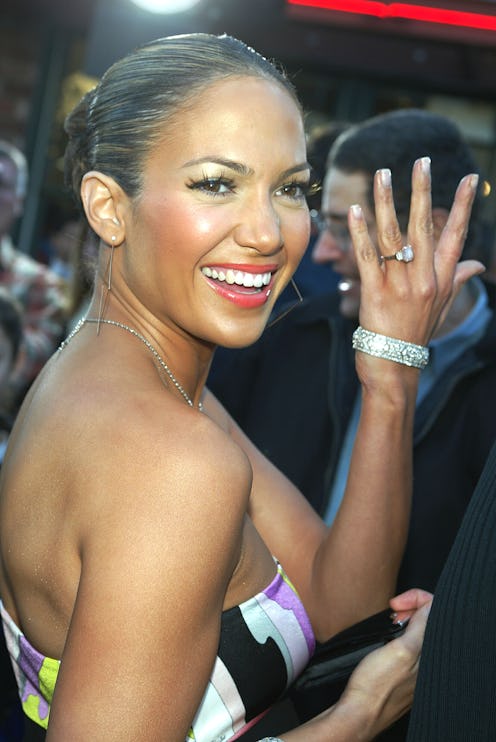Fashion
Engagement Rings: To Wear or Not to Wear?
By Anna Akbari
I never wanted an engagement ring. Ever.
I looked at women with left-hand bling in bewilderment, confused by the baubles’ mass appeal, quietly judging what I interpreted as an antiquated tradition. No ring for me. Never ever, I swore.
Flash forward: I now find myself in a relationship in which we’ve decided to get married. I am told that makes me engaged, and yet, we’re still negotiating the visual signifier. My fiancé would very much like to buy me a ring — a gesture I greatly appreciate — but I’m reluctant. Before, it was just theoretical and therefore easy to speak in absolutes, but now I must move to a real decision: Ring or no ring?
On one of our first dates, we had a spirited discussion about diamond engagement rings. (That may seem like a premature conversation in the first few weeks of courtship, but our relationship has always been atypical, and this was no exception.)
Me: “I never want a ring. That should make you happy.” Him: “Don’t you understand how diamonds work? They’re great investments.”
Are they?
In 2012, couples spent an average of $4,000 on engagement rings, with a one-carat, high-quality diamond currently valued at $12,700. While the right diamonds tend to hold their value — particularly in relation to other wearable items — they don’t offer the same return as investing in stocks and bonds (including, ironically, Tiffany stock).
New technologies are making it possible to reproduce diamonds with such accuracy that even skilled jewelers may be fooled (leading to the question: Is the value in the beauty or the authenticity?). But assuming the relationship lasts and I wear the ring every day for decades, the price per wear in relation to value is impressive and unparalleled from a consumer goods perspective.
So from a financial standpoint, I can see both sides. But the economics of engagement rings was never really my issue. It was something much more elusive and psychological that turned me off.
Perception. What message would I send with a diamond ring? Would it somehow define me? Technically, it may be just a piece of jewelry — but really, it’s SO much more.
I’m not only a woman but also a sociologist, so the diamond engagement ring has fascinated me as much as it’s repelled me. It is a relatively tiny object that speaks more volumes than nearly everything else you are wearing at any given moment. Sweatpants and a two-carat rock? Message received, loud and clear. (Let’s just say the sweats aren’t the dominant symbol.)
Sociologist Thorstein Veblen coined the term “conspicuous consumption,” which refers to how social status is earned via the accumulation and public exhibition of expensive goods. This is particularly applicable to women, whom he argued are the “chief ornaments” of the household — a symbol not of their own economic strength, but their husbands’. They are “putting in evidence their master’s ability to pay.” Ouch, 1899.
Thankfully the past hundred years has squashed much of his argument. That said, do engagement rings perpetuate female disempowerment, or do they build cultural capital?
The social semiotics of rings are fraught with philosophical dilemmas: Is an engagement ring just an expensive way for a man to mark his territory? (Is he peeing on me with diamonds?) Do diamonds — and more importantly, their size — make a statement about my value? Should I judge (or feel envious) when someone posts a ring photo on social media? You may scoff at these questions, insisting you’re above the social marking fray — but chances are, that’s not entirely true.
And then there’s the privacy factor. A diamond engagement ring is a very public symbol of a very private relationship. I’ve always thought they give off TMI. I’ve never wanted to wear a flashing “single” or ”taken” sign when I enter a space. I prefer more anonymity. Giving away too much information is not always advantageous. I don’t pin my bank statement to my lapel, so why advertise my marital status?
And yet, I love symbolism and ritual.
I like the idea of exchanging something to mark this moment and commemorate what is arguably the biggest decision of our lives. I like the visual reminder (for me, not the rest of the world). So what if I move that symbol to another, less traditional body part? Earrings, a necklace? Or what if we mutually invest in a piece of art to hang in our home, a constant reminder of the start of that union? These are alternatives I’m considering. Or — despite my protests — I may just get a ring.
This is not a decision I take lightly. And our final decision will be mutual. He’s not going to “surprise” me with a ring (in addition to other considerations, taste and fit are more important than the thrill of opening a mystery box). Instead, we are consciously redefining our commitment symbol as we begin our life together. How much that object costs and whether I hang it on my body or my wall are factors that are unique to our personal philosophies, financial situation, and aesthetic tastes.
A diamond engagement ring is not one size fits all. So we should stop acting like it is.
Anna Akbari, Ph.D. is a sociologist, entrepreneur, and the "thinking person's stylist." She is the founder of Sociology of Style, which takes an intelligent look at image and culture-related issues and offers holistic image consulting and life coaching services. Find out more and follow her on Twitter.
This article originally appeared at DailyWorth. Copyright 2015. Follow DailyWorth on Twitter and Facebook.
You Might Also Like:How to Talk Money in Each Stage of Your RelationshipWhen He Treats Your Career Like a HobbyDon't Have "The Talk" Yet
